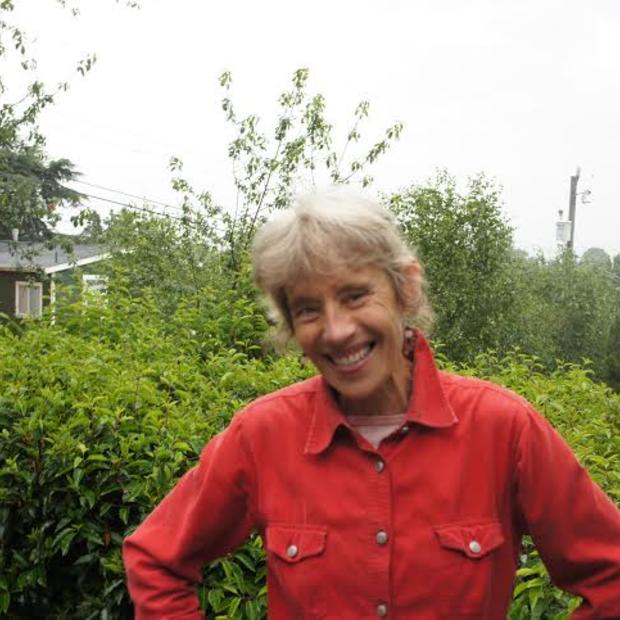Paddles raised to the sky, the fleet came to a halt beside the massive drilling rig, berthed at the Port of Seattle in preparation for Shell Arctic drilling plans this summer. “What do we want,” they chanted. “Climate justice When do we want it? Now.”
Like warriors stalking a target, the fleet of kayaks, tribal canoes, dories and skiffs, glided through Elliot Bay waters slowly Saturday, moving ever closer to the 400-foot long by 300-foot high hulk that looms over the harbor. When the drilling rig, the Polar Pioneer, arrived in the Port of Seattle late last week, it was met by some 20 vessels. On Saturday, there was an estimated 10 times the number, many of the protesters wearing T-shirts with the words, “The People vs. Shell.”
There was no confrontation between the fleet and the oil rig. A single Coast Guard cutter separated the two while two police vessels and one fire boat watched from a distance. The action, said Ahmed Gaya with Rising Tide Seattle, “was a demonstration of how unified the community is against this project. This is a first step in an escalating campaign of nonviolent resistance that will draw a line in the sand and stop it.”
Mobilization against the Pacific Northwest's becoming a fossil fuel export zone for coal, tar sands and crude oil has been growing for years, often taking the form of protests, sit-ins and lawsuits. Shell's plans to use Seattle as a staging area to resume drilling in the Arctic, after a failed attempt in 2012, has strengthened opposition around climate change concerns.
The deepening opposition to Shell will play out in new protests Monday, and likely in the future.
K.C. Golden, senior policy adviser for Climate Solutions, a nonprofit advocate for clean energy, pointed to both the bigger climate picture and Shell's drilling plans as causes for concern. Referring to Shell's Arctic drilling, he said, "Even if they never spill a drop of oil, all the carbon from burning that oil will go up in the atmosphere."
"You think it's remote — it's over there," he added. "You think it's only for a little while, but this is how the fossil fuel economy keeps on chugging along and locks us into a future of hell and high water from disruptive climate change.” Seattle can instead be a a place “where business, labor and environmentalists stand together to chart a more sustainable, hopeful course.”
To chart that course, said Golden, the carbon economy needs to come to a sharp halt. Three-quarters of all fossil fuels remains untapped, including North American coal, tar sands, Bakken crude and oil from the depths of the Arctic's Chukchi Sea. They need to stay underground, according to the science journal Nature, if the planet is to have even a 50 percent chance of avoiding catastrophic global warming. “The only world in which drilling in the Arctic would be economically viable is a world where we burn three times more oil than it takes to wreck the climate," Golden said. "In that dystopia, coastal cities sink under rising, acidified oceans.”
At a rally at West Seattle's Jack Block Park following the water protest, Alaska Innupiat tribal leader Mae Hank, said her people had many concerns about Arctic drilling. Hank, who lives in Port Hope on Alaska's North Slope, said the tribe has opposed offshore development for generations. “We speak for our food, ocean and land. We need to look at the whole picture.” As she spoke, her image was projected on a screen powered by a solar array positioned on a large barge for the benefit of protesters on the water.
Hank told the crowd that not only do unforgiving conditions in the icy waters of the Arctic make the chances of a spill high, but the lack of infrastructure in place to deal with a potential disaster also means the consequences of the move could be calamitous. “The land and the sea are our hunting ground,” said Hank. She said currents surrounding her community go in two directions. “One is so strong we don't hunt on that side.” She said the Innupiat told Shell to not go there. The community asked Shell if would be willing to supply food for the next seven generations if there's an spill there. Hank added, "They said, 'No. We don't do that.'”
Sweetwater Nannauck, a First Nation activist with Idle No More, a grassroots movement among Canada's Aboriginal people also joined the protest. "My people need clean energy jobs," she said. Members of the Duwamish, Lummi, Swinomish and Quiliute tribes, among others, also joined the protest, as did tribes from North Dakota —the Lakota, Mandan and Hidatsu. Many have been affected by the extraction of Bakken crude from North Dakota's shale fields.
The ceremonies and prayers the tribes invoked on the water and on the beach, said Sweetwater Nannauck, were “about coming together in the spirit of our ancestors and to protect what we love.” She and others are headed to the Netherlands this week to attend a Royal Dutch Shell shareholder meeting.
For organizers in Seattle, the next step is a land-based mass action, promoted on the sHellNo.org website, for Monday, “You Shell Not Pass.” The action will begin on Harbor Island near the waterfront where Shell's Polar Pioneer is berthed.



